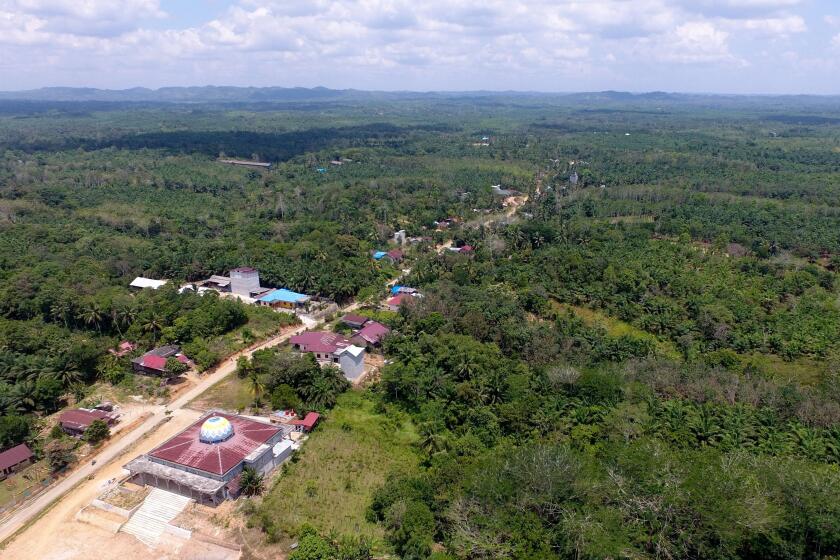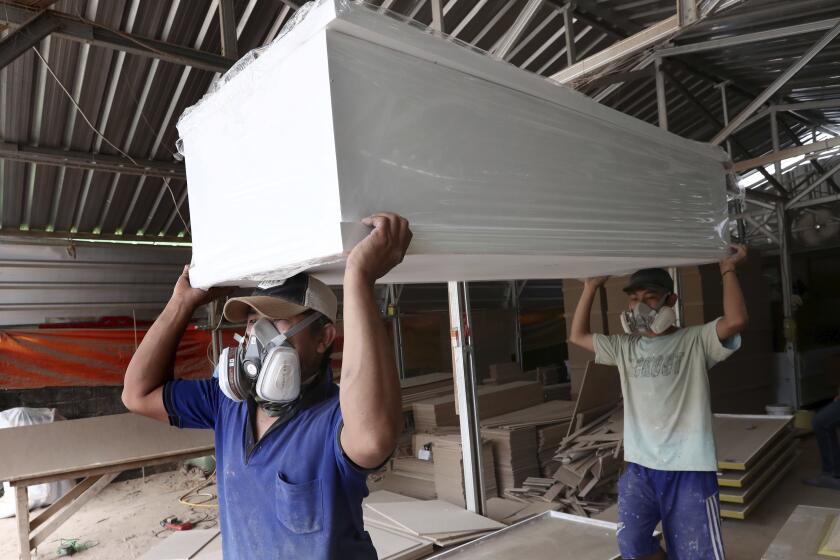The baby was dying in an ambulance, stuck in Jakarta gridlock. Volunteer motorcyclists cleared the way
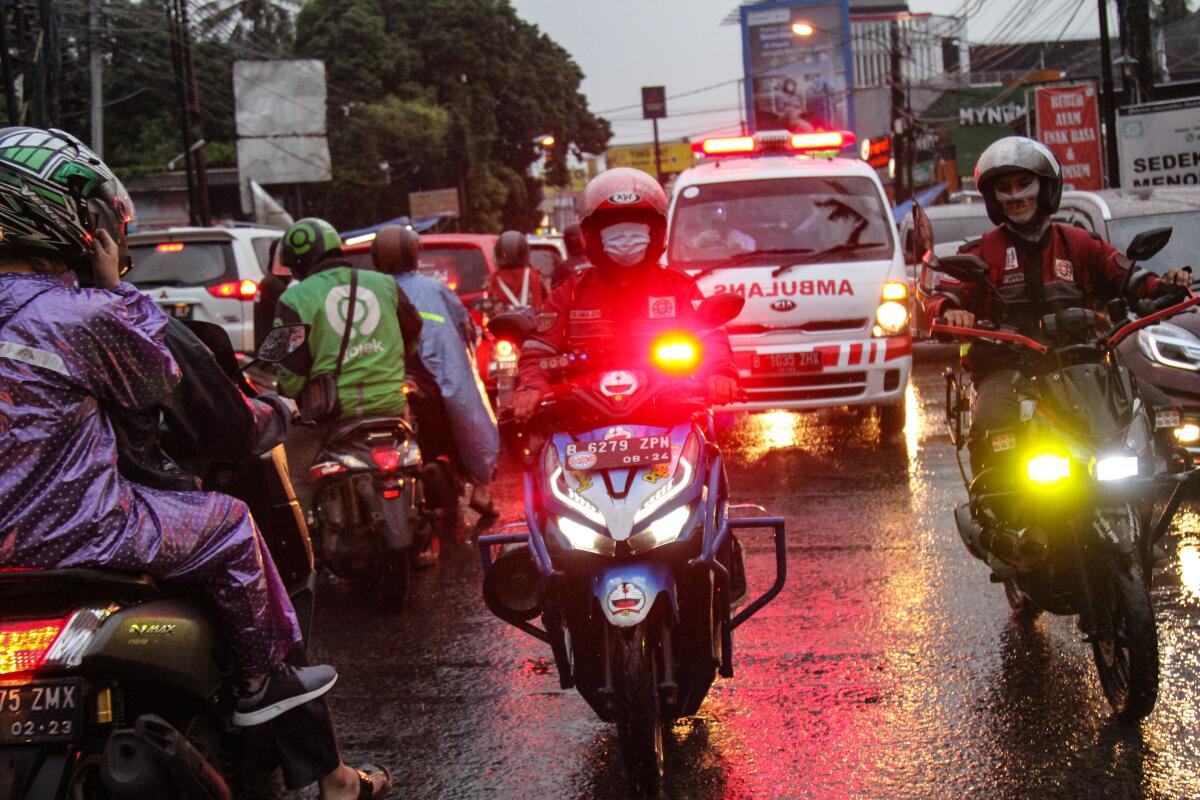
- Share via
JAKARTA, Indonesia — The ambulance wailed, but the cars, trucks and scooters did not budge. The old man inside needed an emergency CT scan. But in this city, home to some of the world’s most miserable traffic, drivers are unforgiving and conditioned to hold their ground, even with someone’s life on the line.
It seemed hopeless. But out of the gridlock and din came Sebastian Dwiantoro and his team of volunteers. The 23-year-old ambulance escort hopped off the back of a motorcycle and bolted through the congestion, tapping on car windows and waving at scooters and motorbikes to make way.
It worked. The traffic parted. Dwiantoro leaped back onto the motorcycle and led the ambulance through an opening — like a running back finding a thread of daylight in a defensive line — only to repeat the tactic moments later.
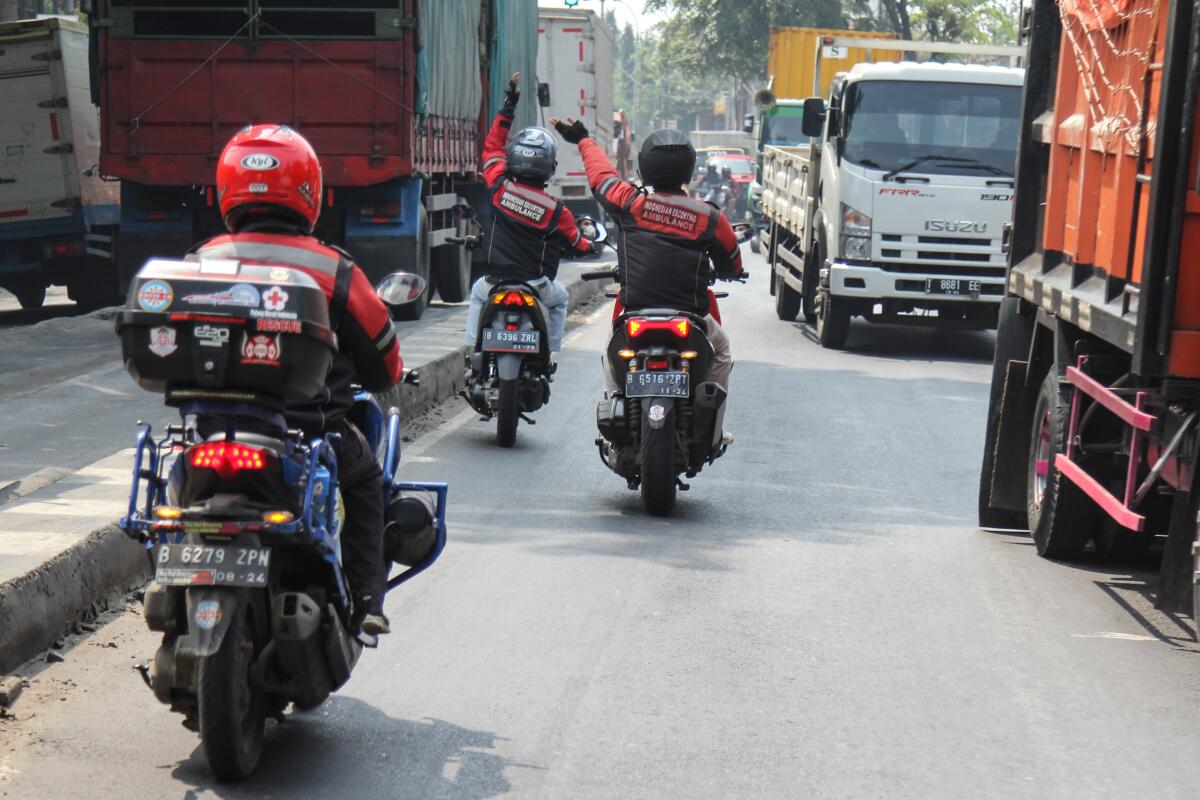
“People don’t want to get out of the way, because the roads are too narrow,” said Dwiantoro, who works as a railway security guard when he’s not volunteering. “A lot of people just ignore us when we ask them to move.”
But sometimes this slight, soft-spoken man on a motorcycle saves a life, as he did in 2019, when he led an ambulance carrying a jaundiced baby 26 miles from a city south of Depok to a hospital in West Jakarta. Speed was crucial. A paramedic shouted from the window that they were running out of oxygen for the infant. Dwiantoro bypassed the snarled toll roads and carved a path on local streets, arriving at the emergency room just in time.
“Whenever I see a traffic jam now,” said Dwiantoro, who rides a red Honda with a liquid-cooled engine, “I think of it like a new challenge, and it makes me want to work harder.”
Several thousand people die each year in the capital due to slow emergency response times. That reality is persistent across Indonesia, an archipelago of more than 17,000 islands that, from coast to coast, stretches 400 miles wider than the United States. Last year, a pregnant woman reportedly was unable to get to the hospital due to a traffic jam in East Nusa Tenggara province, and the baby died.
Jakarta and its brimming suburbs are home to 30 million people. The city consistently ranks among the most congested places on the planet. Navigating the roads in and around the Indonesian capital — even for those like Dwiantoro — can feel like a never-ending, tortuous commute through the Sepulveda Pass, if the 405 Freeway were also inundated with swarms of motorbikes weaving through at impossibly daring speeds.
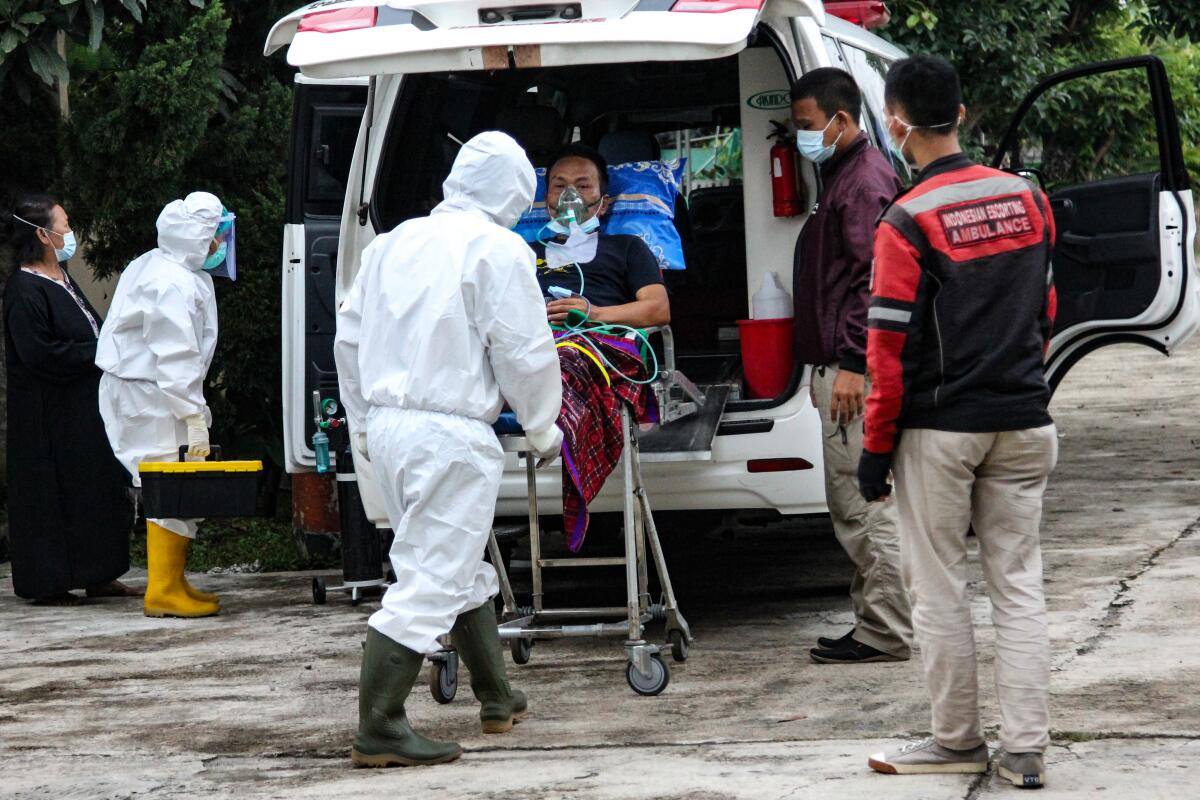
Like other Southeast Asian megacities, Jakarta saw cars multiply as urban planners failed to build enough roads and public transportation. The region introduced its first mass transit line just this year. Former governor Basuki “Ahok” Tjahaja Purnama once likened Jakarta’s lackluster planning to “someone who needed to defecate first before building a toilet.”
It’s that bad. The chronic congestion — smoggy skies give Jakarta a taint of mid-20th century Los Angeles — contributes to the city having among the worst air pollution in the world, prompting private citizens to sue the government in a landmark case that’s drawing widespread attention.
Rather than attempt to fix all of Jakarta’s problems, President Joko Widodo proposed relocating the capital 800 miles away to the island backwater of Borneo. The plan, which has been put on hold, would have uprooted the central government but potentially eased traffic.
It can take hours to traverse just 20 miles in Jakarta, making any ride in an ambulance for a patient in critical condition as nerve-racking and dangerous as the surgery that awaits. It is then that Dwiantoro and his small crew sluice and slice through traffic — pleading, skimming bumpers, looking to save a few precious seconds or minutes.
Indonesia could be trading one environmental disaster for another when it relocates its capital from Jakarta to East Kalimantan, a hotbed of coal mining, gas extraction and palm oil production on the giant island of Borneo.
Though motorists are legally obligated to give way to ambulances, rarely does anyone bother. There is little room to maneuver. Local streets are often wide enough to fit only two cars, and many highways don’t have emergency lanes. Some thoroughfares are flanked by open sewers, making drivers especially nervous about swerving too close to the edge.
“There’s nowhere to pull over,” said Andaris Dikarina, 27, who commutes to work in a Mitsubishi SUV. “I would if I could, but most of the time when there’s an ambulance stuck in congestion, we can’t do anything. It’s stuck with us.”
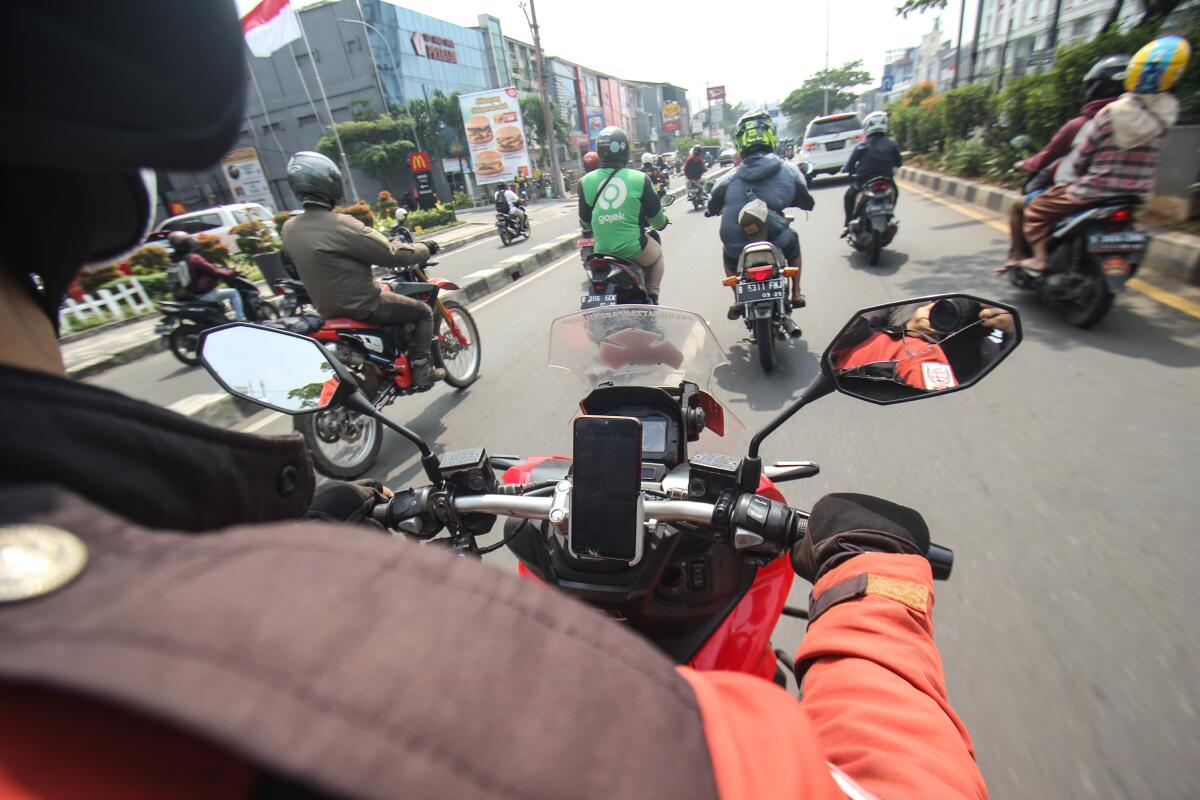
Dwiantoro’s ambulance escort club, awkwardly named Indonesian Escorting Ambulance, or IEA, was formed in 2017 by Nova Widyatmoko, an officer at a disaster relief agency. Widyatmoko grew frustrated at seeing ambulances languishing during his 90-minute commute to Jakarta from his home in Bekasi, 12 miles away.
“It was almost every day that I saw an ambulance trapped,” Widyatmoko said. “Even if they switched on their sirens, the drivers would ignore them. I was so sad.”
Widyatmoko put out a WhatsApp plea to motorcyclists to intervene. The post was shared widely and reached ambulance drivers, who were encouraged to disclose their locations and request help.
Within weeks, Widyatmoko had more than 100 volunteers. They posted videos on social media of riders parting Jakarta traffic with the wave of a hand, which helped to spread interest nationwide. One volunteer in Yogyakarta, a city in Central Java, said he joined the service because his grandmother died in an ambulance that couldn’t reach a hospital in time.
Dwiantoro came across Widyatmoko’s appeal months after it was posted. He had long been horrified by the sight of ambulances inching toward their destinations, as he wondered about the condition of the patients inside. Dwiantoro had grown up helping others; his parents had signed up him and his siblings to deliver food to the poor. He joined IEA as a volunteer after learning it had a chapter in his hometown of Depok, about 18 miles south of central Jakarta.
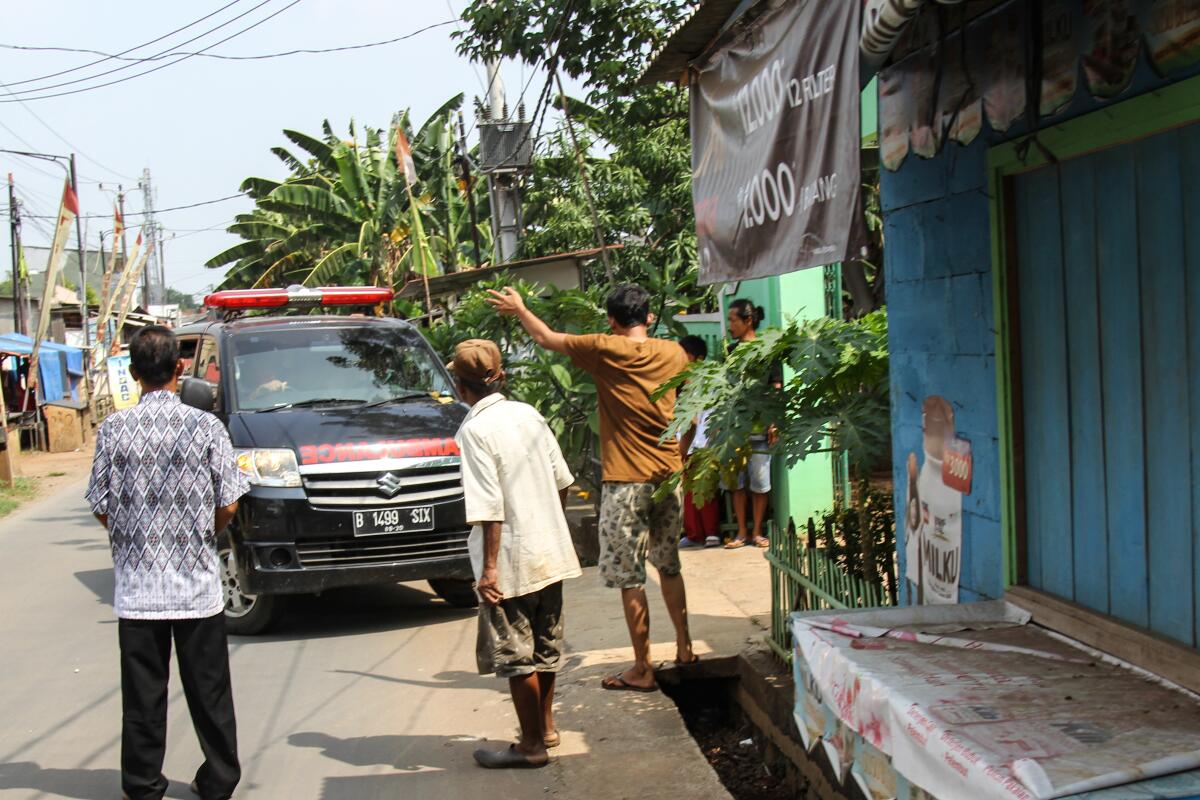
It wasn’t easy at first. Dwiantoro encountered impatient and obstinate motorists. Some would ignore him; others would dismiss him by saying he had no right to ask them to move because he was not a police officer. The most arrogant drivers were often those in positions of authority, particularly men in uniform.
“Big egos,” said Dwiantoro, who prays for endless patience. “They refuse to get out of the way. And they should know the law, because they work for the government.”
A fellow volunteer was once clipped by a vehicle, toppling his motorbike, which dragged him several dozen feet. He was not seriously hurt.
Indonesia’s government dithered for nearly two months before enacting social restrictions. Tens of thousands could die of COVID-19.
Nothing, however, prepared Dwiantoro for the past year, when Jakarta was overrun by COVID-19. The capital was the leading hot spot of the country’s outbreak — the worst in Southeast Asia, with more than 1.8 million confirmed cases and 51,000 deaths in a country of 270 million.
Dwiantoro and others escorted ambulances delivering corpses of COVID-19 victims in wood coffins to cemeteries, which were quickly running out of room. The volunteers, covered in personal protective equipment they bought for themselves, did what few others dared at the time: They helped lift the caskets.
For weeks on end, it seemed like the only requests coming from ambulance drivers were for escorting COVID-19 patients to hospitals or isolation centers. The group still receives those requests, but only a fraction compared with what it saw at the end of last year.
Still, fears are growing of another wave in Indonesia, with the arrival of the infectious Delta variant, first detected in India, and the return of millions of people who had traveled across the country to celebrate the Hari Raya Aidilfitri festival, marking the end of dawn-to-dusk fasting for Ramadan.
“The difference from last year,” said Dwiantoro, “is now, when drivers see ambulance workers wearing PPE, they will pull over, because they know COVID is a dangerous disease.”
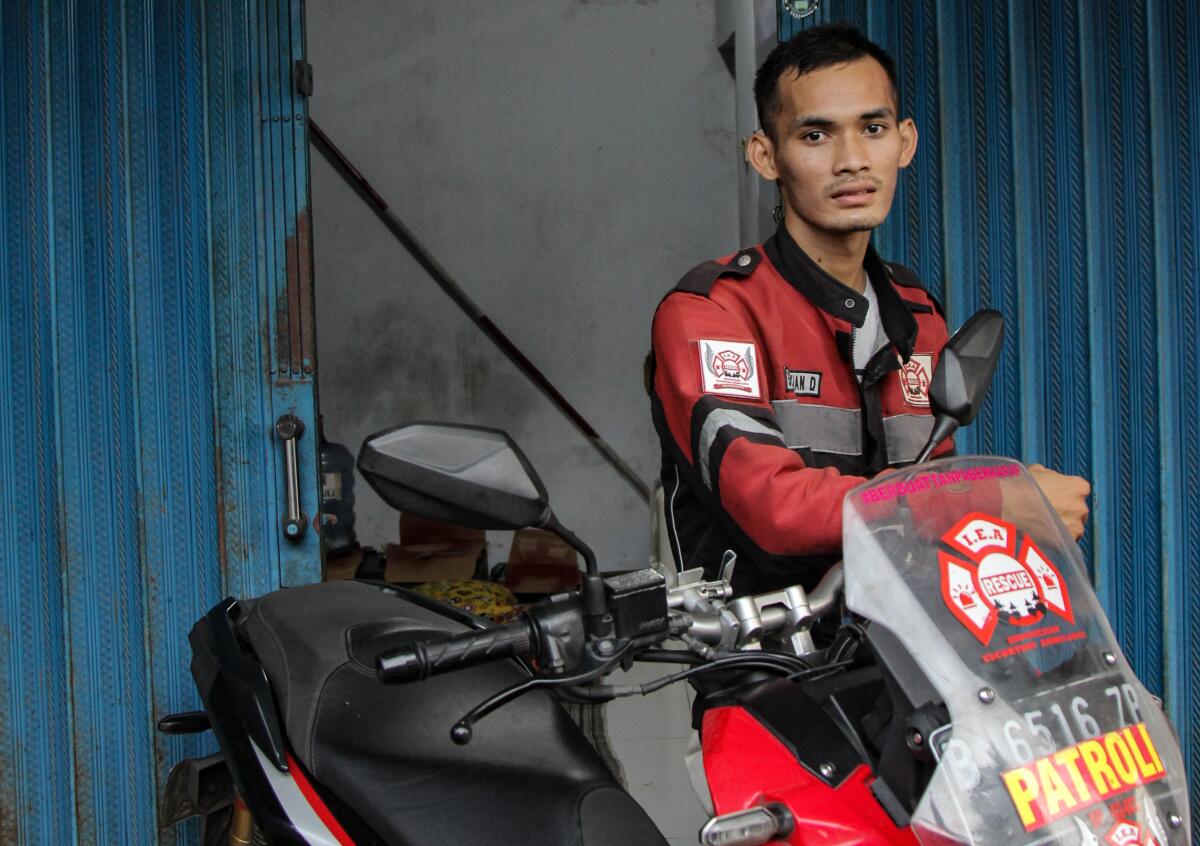
The IEA is now a formal organization with 123 branches and more than 1,000 volunteers nationwide. It raises funds through donations, membership dues and the sale of T-shirts and other merchandise. Volunteers receive training in safety and basic lifesaving skills and coordinate with groups like the Indonesian Red Cross Society.
Motorists today are less surprised to see the volunteers, who are recognizable by their red-and-black motorcycle jackets decorated with patches. Among them now are Dwiantoro’s girlfriend and his older brother, whom he recently persuaded to volunteer. The three are inseparable, playing soccer or exploring Java’s volcanic landscape on long-distance motorbike rides.
Dwiantoro said rival escort groups have formed, organized by volunteers who couldn’t meet the IEA’s requirements for road safety and vehicle ownership. He said one such group recently clashed with police officers who were escorting government officials. A clip of the confrontation was shared widely on WhatsApp.
Although that incident has brought unwanted attention to the volunteer work, Dwiantoro keeps at it everyday. It’s become his duty, a way a man can change things. He says the group’s skilled drivers have become even more essential during the country’s health crisis. With lockdowns lifted and traffic returning full-bore, Dwiantoro is preparing for countless more hours on the car-choked roads of Jakarta.
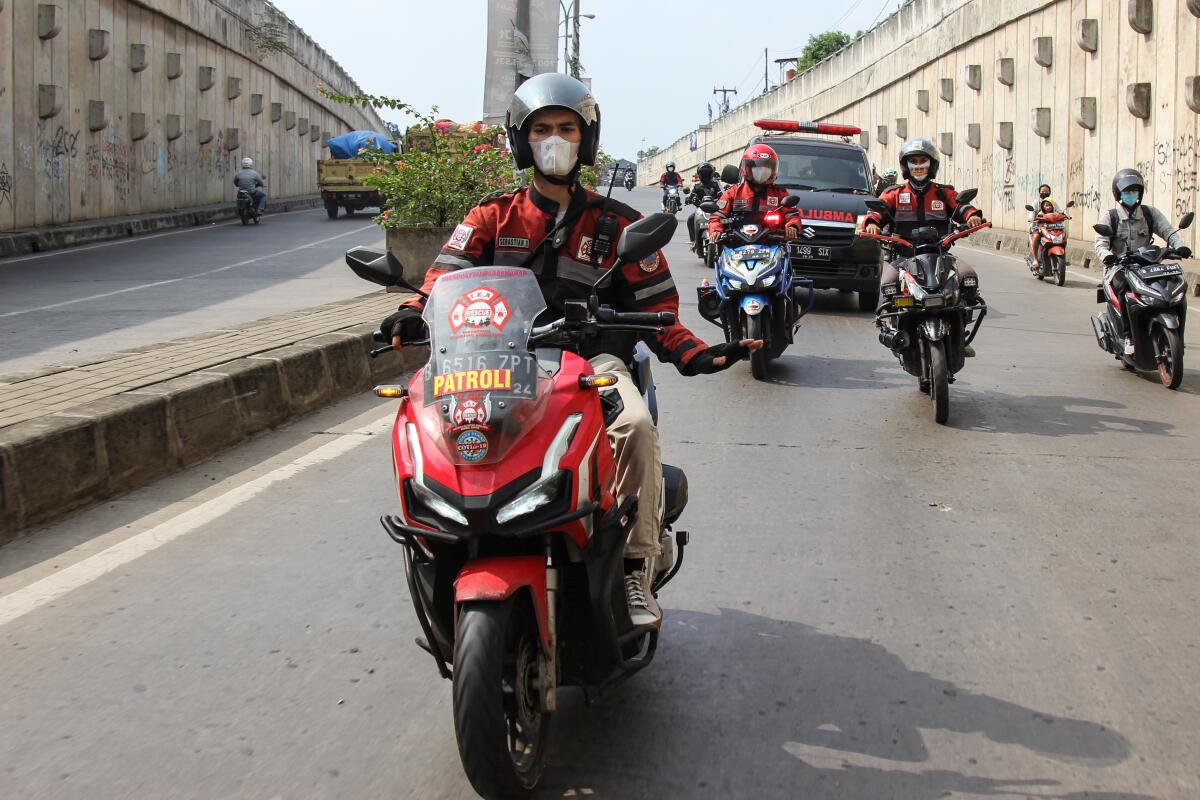
Times staff writer Pierson reported from Singapore and special correspondent Hutabarat from Jakarta.
More to Read
Sign up for Essential California
The most important California stories and recommendations in your inbox every morning.
You may occasionally receive promotional content from the Los Angeles Times.
